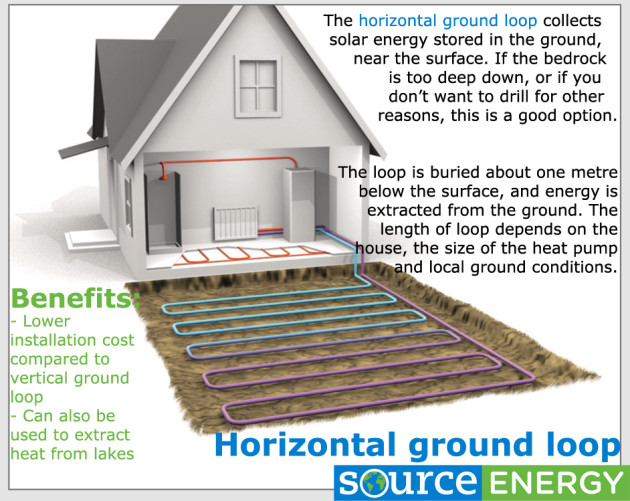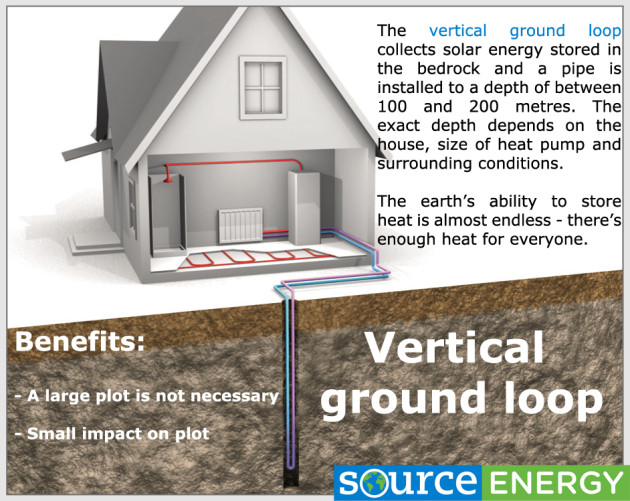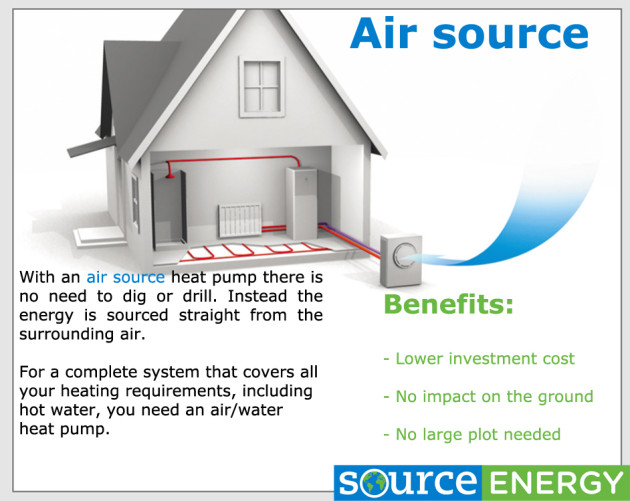Understanding heat pumps
How do heat pumps work? The following images and information should help you understand. If you have any questions please call us on 0800 865 4328 to speak to one of our heat pump experts.
We specialise in finding the best solutions for customers across the UK. Select your area or request a free quote today. Heat pump installations can be eligible for the domestic RHI or commercial RHI. The Renewable Heat Incentive is a government initiative which will pay you money back for installing heat pumps. Visit our Finance zone for more information >>
Ground source heat pumps:
Horizontal ground loop

If outside space is available, horizontal ground loops are often the easiest and most cost effective solution for ground source heat pumps. This system consists of narrow trenches of 1 metre depth laid with a continuous length of polyethylene pipe.
We use single horizontal pipe in trenches rather than slinky coiled loops. This ensures the system does not over-extract energy from a concentrated area of ground. Extracting energy from an undersized area may result in freezing, meaning your heat pump may not work.
Benefits:
- Cost effective and less site disruption than drilling boreholes.
- Once the land has been in-filled there is no evidence of the pipe work or scars from the trenches.
Considerations:
- Outside space is required for trenches. The land available for trenches should be roughly twice the size of the heated area of the house. Our experienced sales managers will be able to assess if you have sufficient external space in order to provide enough energy to successfully produce heating and hot water for your home.
Vertical ground loop

Vertical boreholes can be drilled into the land and filled with a closed polyethylene u-tube to extract heat from the ground. These boreholes can be up to 100 metres in depth depending on ground conditions. Multiple boreholes can be drilled to meet the heating and hot water demands of larger properties.
Benefits:
- Hard rocks such as granite have a very high thermal conductivity. This increases the efficiency of the heat pump system.
- Source Energy will co-ordinate the drilling for you with our reliable and experienced drilling contractors. Your dedicated project coordinator will ensure your project is managed efficiently and effectively.
Considerations:
- Soft rocks can be difficult to drill. This can increase the cost of the installation. In addition, soft rocks do not have the thermal capacity of harder rocks such as granite. Our experienced drilling contractors will survey the geology of the area and provide you with the best advice and guidance.
- The site must be accessible for drilling rigs. Our contractors will advise if your site is appropriate for this solution.
Air source heat pumps:

Air source heat pumps have external fan units which sit outside the property. Dependent on the heat pump design, the unit uses a heat exchanger to capture energy directly from the air. This ambient heat energy from the environment can then be piped via a low temperature water and glycol mixture into the property. The energy is then compressed to form higher temperatures.
Benefits:
- Air source heat pumps are a highly cost effective option to ground source heat pumps.
- Air source heat pumps can supply all of your hot water and heating, using one source of renewable energy.
- Air source heat pumps are suitable for a wide range of properties including those with limited internal space.
- Existing properties meeting modern building standards can easily integrate air source heat pumps with minimal disruption.
- Air source heat pump installations cause less disruption to the site compared to ground source heat pumps, making integration into existing properties a straightforward process.
- Air source heat pumps are now covered by Permitted Development legislation because they can improve the efficiency of existing buildings, although noise levels must be taken into account.
Considerations:
- Compared to ground source heat pumps, air source heat pumps have lower operating efficiencies due to fluctuations in air temperature.
- Noise: Air source heat pumps do not run as discretely as ground source heat pumps. At Source Energy, we carefully choose heat pump models which produce no more noise than an average fridge.
- To ensure you are not disturbed by the heat pump, we will discuss the ideal positioning of the unit. We will also invite you to see a working air source heat pump in your area. This will allow you to make your own judgement on the noise generated.
- If a heat pump is required for space heating, properties must have modern insulation to maintain a high efficiency. Source Energy can provide stand alone hot water options for those faced with this dilemma, aimed to help partially reduce energy bills.
For more information about heat pumps, and answers to questions such as “Is my property suitable for a heat pump?”, click here>>
Source Energy – Installing heat pumps for over 10 years
Source Energy, have been designing, supplying, installing, commissioning and maintaining ground and air source heat systems for over 10 years. Our portfolio now exceeds 600 projects across the UK.
Our new heat pump help hub will be at 7 exhibitions throughout the UK in 2015. You can get free tickets to our first event at The National Homebuilding & Renovating Show in March!
The UK’s biggest self-build and renovation event at the NEC in Birmingham on 26-29 March will boast over 500 exhibitors. We think it would be a great opportunity to meet you.
Want free tickets and more helpful information?
Just sign up for our newsletter so we can send you all the information you need to claim your free tickets and meet us in March!